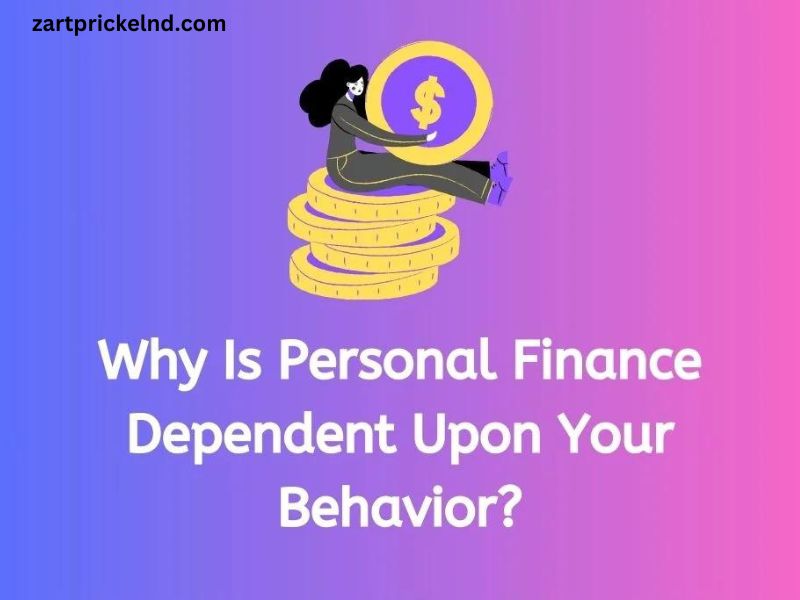Personal finance is a critical aspect of your life that encompasses everything from budgeting and saving to investing and debt management. It’s not just about numbers on a spreadsheet; it’s about the decisions you make and the behaviors you exhibit that ultimately determine your financial well-being. Your personal finance is inextricably linked to your behavior, and understanding this connection is the key to achieving your financial goals.
Understanding Personal Finance Behavior
Your personal finance behavior refers to the way you think, feel, and act when it comes to managing your money. This includes your attitudes, beliefs, and habits surrounding spending, saving, investing, and debt. These behaviors are often deeply ingrained and can be influenced by a variety of factors, such as your upbringing, education, and life experiences.
The Impact of Behavior on Personal Finance
Your personal finance behavior has a direct and significant impact on your financial outcomes. For example, if you have a tendency to overspend or impulse buy, this can lead to debt, reduced savings, and missed opportunities for investment. Conversely, if you have good financial habits, such as budgeting, saving regularly, and making informed investment decisions, you’re more likely to achieve your financial goals and build wealth over time.
Common Behavior Patterns That Affect Personal Finance
Some common behavior patterns that can affect your personal finance include:
- Impulse Spending: The tendency to make unplanned purchases without considering the long-term consequences.
- Emotional Spending: Using shopping or spending as a way to cope with stress, boredom, or other negative emotions.
- Procrastination: Putting off important financial tasks, such as budgeting, saving, or investing, which can lead to missed opportunities and suboptimal outcomes.
- Risk Aversion: Being overly cautious with your investments, which can limit your potential for growth and long-term wealth accumulation.
- Lack of Financial Literacy: Not having a good understanding of personal finance concepts, which can lead to poor decision-making and missed opportunities.
The Psychology Behind Personal Finance Behavior
Your personal finance behavior is heavily influenced by your psychology, including your beliefs, values, and cognitive biases. For example, the concept of “loss aversion” – the tendency to feel the pain of a loss more acutely than the pleasure of a gain – can lead to suboptimal investment decisions. Understanding the psychological factors that shape your financial behavior is crucial for developing effective strategies to improve your personal finance management.
Strategies for Improving Personal Finance Behavior
Improving your personal finance behavior requires a multifaceted approach. Some strategies you can consider include:
- Self-Awareness: Developing a deep understanding of your own financial behaviors, habits, and tendencies.
- Goal Setting: Establishing clear, specific, and measurable financial goals to provide a roadmap for your decision-making.
- Habit Formation: Cultivating positive financial habits, such as budgeting, saving, and investing, through consistent practice.
- Accountability: Enlisting the help of a financial advisor, coach, or support group to hold you accountable for your financial decisions and behaviors.
- Continuous Learning: Regularly educating yourself on personal finance concepts, trends, and best practices to make informed decisions.
Tools and Resources for Tracking and Managing Personal Finance Behavior
There are a variety of tools and resources available to help you track and manage your personal finance behavior, including:
- Budgeting Apps: Apps like Mint, YNAB, and PocketGuard that help you create and monitor your budget.
- Investment Tracking Tools: Apps and websites like Personal Capital and Betterment that provide a comprehensive view of your investment portfolio.
- Behavioral Finance Books: Books like “Predictably Irrational” by Dan Ariely and “Thinking, Fast and Slow” by Daniel Kahneman that explore the psychology of financial decision-making.
- Financial Coaching: Working with a professional financial coach or advisor who can help you identify and address your personal finance behaviors.
Case Studies: Examples of How Behavior Affects Personal Finance
Case Study 1: The Impulse Spender Sarah, a young professional, had a tendency to make unplanned purchases, often using her credit card to buy things she didn’t really need. This behavior led to mounting debt, which in turn caused her significant stress and anxiety. After working with a financial coach, Sarah was able to identify the triggers that led to her impulse spending and develop strategies to curb this behavior, such as implementing a 24-hour waiting period before making any non-essential purchases. As a result, Sarah was able to pay off her debt, start saving regularly, and feel more in control of her financial future.
Case Study 2: The Risk-Averse Investor John, a middle-aged professional, had a deep-seated fear of losing money in the stock market. This led him to keep the majority of his savings in low-yield savings accounts, missing out on the potential for long-term growth that investing in the market could provide. After attending a seminar on behavioral finance, John realized that his fear of loss was holding him back from achieving his financial goals. He worked with a financial advisor to develop a diversified investment portfolio that aligned with his risk tolerance and long-term objectives. Over time, John became more comfortable with market fluctuations and was able to grow his wealth through a balanced investment strategy.
The Role of Education in Shaping Personal Finance Behavior
Education plays a crucial role in shaping your personal finance behavior. By learning about personal finance concepts, such as budgeting, saving, investing, and debt management, you can develop a better understanding of how to make informed financial decisions. Additionally, education can help you recognize and overcome the psychological biases and cognitive shortcuts that can lead to suboptimal financial behaviors.
Conclusion
Your personal finance is inextricably linked to your behavior, and understanding this connection is the key to achieving your financial goals. By developing self-awareness, setting clear financial goals, cultivating positive habits, and utilizing the right tools and resources, you can take control of your personal finance behavior and build a secure financial future.
Ready to take control of your personal finance behavior? Download our free guide, “10 Proven Strategies to Improve Your Financial Habits,” and start your journey towards financial well-being today.



